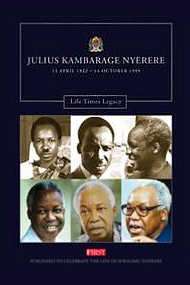Nyerere and the Catholic Church
Julius Kambarage Nyerere 1922 to 1999 Roman Catholic Church Tanzania
Julius Kambarage Burito Nyerere was born in 1922 at Butiama village, Musoma, Tanzania. He was a Zanaki by tribe. His father was Chief Burito Nyerere and his mother was Mgaya Wanyang'ombe. His father died while Kambarage was still young. His mother who raised him died in 1997 at the ripe old age of almost 100. Kambarage, the name he was given at birth, means "the spirit which gives rain" in Zanaki because the day he was born a very heavy rain fell.
In 1934 he was admitted to Mwetenge Primary School in Musoma, Tanzania, a school that was about forty-two kilometers from his home. Nyerere was a brilliant and hard working student. He regularly scored the highest marks in the class and was the leading pupil in all examinations. He received the highest score in the country on the standard four examination. After that he undertook studies at Tabora Government School in 1937, graduating in 1942.
When he reached the age of twenty, he decided to join the Roman Catholic Church. For the occasion he was asked to take a baptismal name so he chose the name Julius. He was baptized on December 23, 1943 by Father Mathias Koenen.
After passing the examination at Tabora quite successfully, he was able to begin studies at Makerere University in 1945. At the university, Nyerere liked to talk about politics, especially the politics of liberation. He also preferred traditional African dances to western…

